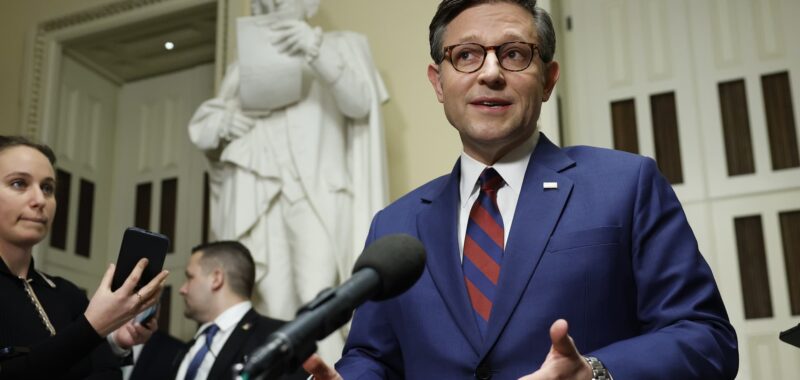
WASHINGTON â With just hours to go before the federal government begins shutting down for lack of funds, House Republicans on Friday plan to hold a vote to fund the government for three months and provide disaster relief and farm aid.
In order to pass the full House before the midnight shutdown deadline, however, the bill, released late Friday afternoon, will require significant Democratic support. It will also need a realistic path to passing the Democratic-controlled Senate.
House Speaker Mike Johnson, R-La., said he was committed to avoiding a shutdown that could jeopardize paychecks for hundreds of thousands of federal employees a few days before Christmas.
“We will not have a government shutdown,” Johnson told reporters in the Capitol Friday afternoon. “We will meet our obligations for our farmers who need aid, disaster victims all over the country and make sure that military and essential services and everyone that relies on the federal government for a paycheck is paid over the holidays.”
It was not clear how Democrats, led by Minority Leader Hakeem Jeffries, D-N.Y., would react to the standalone bill. But early signs were encouraging.
“This is a bill that may find faith among enough Democrats to help the speaker of the House get the bill passed,” said Rep. James Clyburn, D-S.C., a longtime party leader, on MSNBC’s “Deadline White House.”
Earlier in the day, Jeffries told a group of politically vulnerable Democrats that he hoped to get the impasse resolved, according to Jake Sherman of Punchbowl News.
The vote would cap off several days of chaos on Capitol Hill, during which Johnson tried, and failed, to meet the demands of President-elect Donald Trump.
Trump and his billionaire campaign donor Elon Musk, the Tesla CEO, doomed an initial, negotiated funding plan Wednesday by harshly criticizing its provisions, sending Republicans scrambling most of Thursday to find a replacement plan.
Specifically, Trump insisted that any deal to keep the government open must include a two-year suspension of the U.S. debt limit. The limit is the maximum the federal government can borrow to pay for its spending.
The debt ceiling is a recurring, bitter debate in Washington every few years, and one where the political party in the minority typically has a lot of leverage. Trump appears eager to avoid this fight during the start of his second term in office.
But authorizing the United States to borrow more money is a bridge too far for many hardline conservative Republicans.
This was evident when Thursday’s bill, which contained bare bones government funding and a debt limit hike, was resoundingly defeated. Joining nearly every Democrat were 38 rank-and-file Republicans who voted against it, after their party’s leader had publicly endorsed the deal.
If Friday’s effort to avert a shutdown succeeds, it will serve as a reminder for Trump of just how difficult it is to control the notoriously fractious House Republican caucus.
This is a developing story. Please check back for updates.

